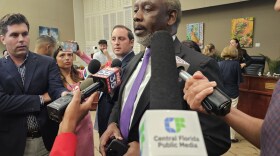Florida leaders and state public health experts are reconsidering their relationship with vaccines. Earlier this month, State Surgeon General Dr. Joseph Ladapo announced plans to eliminate vaccine mandates. Now, Ladapo wants to go one step further – banning mRNA vaccines.
Public health experts outside of Florida think this would be a big mistake for the state, its residents, and its researchers – and have widespread public health implications.
“It would set Florida back,” said Dr. Georges Benjamin, executive director of the American Public Health Association. “Depending on how they craft the legislation, your researchers may not be able to do the kind of research. That means loss of the ability to do that kind of research. You may lose some very prominent researchers in the state.”
Last week, Ladapo appeared on the podcast On Call, discussing the recent announcement of Florida’s plans to do away with four of the state’s vaccine mandates.
During the podcast, Ladapo said while mandates would be rolled back, accessibility to vaccines would remain – unless they are mRNA vaccines.
“No one should be using that one,” Ladapo said.
What is mRNA technology?
Messenger RNA, or mRNA, is a piece of genetic material that instructs cells how to behave. In terms of vaccines, mRNA research began in the 1970s, according to Johns Hopkins University, but it was first brought to market during the COVID-19 pandemic. A virus protein enters a cell and instructs the body’s DNA how to create antibodies against the virus.
Why is Florida against the mRNA vaccine?
The surgeon general has expressed his mistrust of mRNA in the state over the last three years.
In 2022, Ladapo issued guidance recommending against the mRNA COVID vaccine, specifically against using the vaccine for males ages 18 to 39, and cited research by the Florida Department of Health that indicated an 84% increase in the relative incidence of cardiac-related death, such as the inflammation of heart muscles brought on by myocarditis.
Multiple research groups have pushed back against the FDOH’s analysis and questioned its validity due to violating research integrity policies at the University of Florida.
Ladapo has also voiced concerns regarding mRNA and “DNA integration,” or the insertion of foreign DNA and its influences on a host's DNA. In 2023, the surgeon general wrote a letter to the Centers for Disease Control and Prevention asking if it performed a DNA integration test on the mRNA COVID vaccines. According to Ladapo, the letter was unanswered. However, multiple researchers have said there is no evidence to warrant such a test, as mRNA vaccines do not enter the nucleus of a cell and cannot influence DNA.
Will a ban on 1 mRNA vaccine affect research into others?
The surgeon general says that the Florida Department of Health is working with lawmakers for the upcoming legislative session to file legislation that would roll back vaccine mandates. Central Florida Public Media reached out to the FDOH and asked if mRNA vaccines would be banned as part of that legislation.
“The Department is not limiting mRNA technology in Florida,” the FDOH said, and it “foresees no impacts to mRNA technology research in Florida.”
Central Florida Public Media also asked for clarification on Ladapo’s podcast comments, but the FDOH said that it had nothing to add.
Ladapo has previously called into question mechanisms with the COVID mRNA vaccines, mechanisms that other mRNA technologies could be using.
No ban of any kind has been proposed. But if a ban were to take place, Florida would lose vaccine options, Benjamin said.
“People who live in Florida would have to leave the state to get appropriate therapy using mRNA technologies,” he said.
Only COVID-19 vaccines use mRNA technology. More are in development for illnesses like the flu.
A ban on mRNA could cause the state to lose more than vaccine availability. It could include research being done to cure cancer. The University of Florida and the University of Miami both have grant-funded research in testing mRNA technology on how to instruct the body to eliminate cancerous cells.
Benjamin sees it as a watershed moment in beating cancer.
“mRNA is one piece of that puzzle,” he said. “I believe we're at a breakout moment where we're about to see just phenomenal improvements based on our understanding and our capacity to use mRNA technology and really improve our quality of life, and maybe one day actually be able to totally reduce dramatically our risk of getting cancer.”
If a ban were to happen, he fears that not only would Florida researchers be limited from experimenting with such technology, but it could contribute to a brain-drain from the state.
“This research really drives a lot of economic development. It drives jobs, it drives the use of products and other materials in your labs, and it means that many people in your state may not be eligible to participate in cutting-edge scientific research discoveries. To participate in research studies, you may have to leave the state to do it.”






